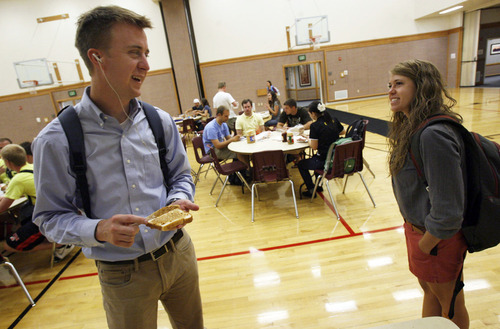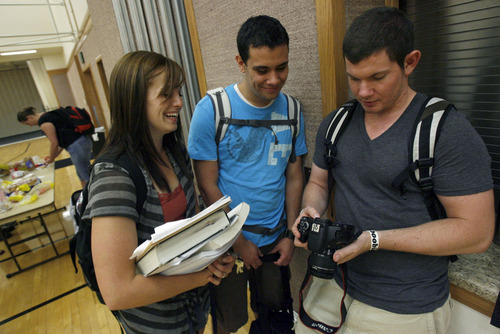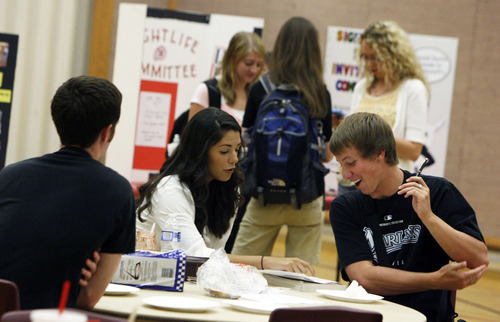This is an archived article that was published on sltrib.com in 2011, and information in the article may be outdated. It is provided only for personal research purposes and may not be reprinted.
Something's missing from the University of Utah's social scene — at least, for Mormons.
Institute classes? No. They're still there.
Singles wards? Nope. They've been revamped, but they're still around, too.
LDS frats and sororities? You got it. They're gone.
The Church of Jesus Christ of Latter-day Saints has disbanded its fraternities and sororities at the U., putting an end to two organizations — Sigma Gamma Chi and Lambda Delta Sigma — that began before the world had ever heard of sunscreen, World War II and gasoline prices higher than 30 cents a gallon.
Why? Because the Salt Lake City-based faith says the activities that long defined those clubs are better placed in the hands of local congregations, overseen by spiritual leaders such as bishops and stake presidents.
It's a historic change — one that may be hard to swallow for students such as Kristin Ward, who forged friendships, strengthened faith and even coaxed an occasional Brigham Young University Cougar out for ice cream as part of an LDS-centered social club that has existed on the U. campus since 1936.
"I generally don't have a hard time accepting anything that the church puts out," Ward said. "But the sorority changed my life. I cried."
Earlier this year, the LDS Church announced a massive restructuring of its young adult congregations. Instead of offering student-only wards, the church created "young single adult" congregations that cater to Mormons between ages 18 and 30. The vision, according to church leaders, was to create "larger units of sociability" that would provide more opportunities for leadership.
With that change came another one: no more church social clubs.
The decision marked an abrupt end for the U.'s Sigma Gamma Chi and Lambda Delta Sigma, which had survived a 1999 church reorganization that discontinued every other LDS-sponsored frat and sorority in the nation. In the end, Sigma Gamma Chi had 12 chapters at the U. Lambda Delta Sigma had 17.
The church wasn't targeting those clubs, insists Rory Bigelow, assistant administrator for LDS seminaries and institutes. The decision was much larger than the U. Bigelow said officials also dissolved institute-related men's and women's organizations — which took the place of student sororities and frats — across the country.
"It was a broad-brush stroke," he said.
Did it have something to do with LDS President Thomas S. Monson's remarks in April, when he urged young men and young women to do less hanging out and more dating to prepare for marriage?
If so, Bigelow is unaware of it.
Instead, Bigelow said the move is about placing the stewardship of activities where it belongs: in the hands of spiritual leaders.
Question is, will singles wards and stakes have the same socializing power that Sigma Gamma Chi and Lambda Delta Sigma had?
Jake Garfield doesn't think so. The U. student joined the Mormon frat during his second semester after struggling to fit into the social scene in the months before his LDS mission to Atlanta. There, he found a chapter of like-minded, and like-situated, Latter-day Saints.
"It gave me the LDS-based social life that would have been hard to find elsewhere," said Garfield, now a senior studying Spanish and economics.
Garfield doubts that a singles ward — or stake — could offer the same level of close-knit camaraderie. A church congregation, he said, is simply too large.
Then there are issues of inclusion.
Gail Garfield, president of a Lambda Delta Sigma chapter and Jake Garfield's sister, said the sorority offered a middle ground for students who might not have been church-going, but still wanted to socialize with LDS students. She worries that those people might "gravitate away from the church."
When it comes to filling those gaps, wards and stakes seem to be trying, according to Steve Jorgensen, who would have served as president of all Sigma Gamma Chi chapters at the U. this year. But it's a tall order.
The school's Mormon social clubs created a wide, and readily accessible, network of LDS students that could be mobilized with gloved hands for service projects or with cans of tomato soup for the U.'s rivalry week food drive.
"I don't think there is anything the wards and stakes can do — or the institute," Jorgensen said, "that will have the same impact on the University of Utah."
But Jorgensen said he supports the decision — and he is encouraging others to do the same. He now is part of the institute's campus-relations committee. It's hard work, especially without an organization to effectively rally students together.
Bigelow said the church's decision to disband Sigma Gamma Chi and Lambda Delta Sigma wasn't because those groups were ineffective or because the church was somehow dissatisfied with their activities. It was about a change in direction.
"The general feeling we have had is that they have been successful and done a great deal of good," he said. "In their time and place, they were a great blessing for young people."
Jorgensen has already noticed a difference on campus. It came on a recent Wednesday night when the institute — normally buzzing with club activities — was quiet.
"The university experience," he said, "is going to be a lot different now."
Twitter: Stettler_Trib







